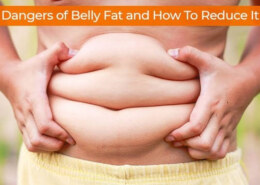Belly fat, also known as abdominal or visceral fat, refers to the fat stored around the abdomen. This type of fat isn’t just limited to the layer of fat located directly under the skin (subcutaneous fat) but also includes the deeper fat that surrounds the internal organs (visceral fat).
Health Implications:
Increased Risk of Chronic Diseases: Excessive belly fat is associated with a higher risk of chronic health conditions such as heart disease, type 2 diabetes, and certain cancers.
Metabolic Disorders: Visceral fat secretes hormones and inflammatory substances that can disrupt normal metabolic function, leading to insulin resistance, high blood pressure, and abnormal cholesterol levels.
Inflammation: The excess fat cells in the abdominal region can trigger inflammation throughout the body, contributing to various health issues.
Reduced Life Expectancy: Studies suggest that individuals with higher amounts of belly fat have a shorter life expectancy compared to those with a healthy waist circumference.
Addressing belly fat is crucial not only for aesthetic reasons but, more importantly, for mitigating the associated health risks and promoting overall well-being.
Certainly! Here are effective methods to lose belly fat without exercising:
1.Healthy Diet:
A healthy diet plays a pivotal role in reducing belly fat. Focus on a balanced, nutrient-rich diet:
- Portion Control: Monitor portion sizes to avoid overeating.
- Whole Foods: Opt for whole grains, lean proteins, fruits, vegetables, and healthy fats. Avoid processed foods and sugary beverages.
- High-Fiber Foods: Include fiber-rich foods like beans, legumes, nuts, seeds, and vegetables to aid digestion and promote a feeling of fullness.
2. Mindful Eating:
Pay attention to how and when you eat:
- Chew Slowly: Chew food thoroughly and eat slowly to aid digestion and allow your body to recognize fullness signals.
- Avoid Distractions: Minimize distractions while eating, such as watching TV or using electronic devices, to focus on your meal.
3 Hydration:
Drink plenty of water:
- Water Intake: Aim for adequate hydration throughout the day. Sometimes thirst can be mistaken for hunger.
- Replace Sugary Drinks: Substitute sugary beverages with water, herbal teas, or infused water.
4. Sleep Quality:
Prioritize quality sleep:
- Consistent Sleep Schedule: Maintain a regular sleep routine to improve metabolism and reduce stress hormones associated with belly fat.
- Adequate Sleep: Aim for 7-9 hours of quality sleep per night.
5. Stress Management:
Manage stress levels effectively:
- Mindfulness and Relaxation Techniques: Practice meditation, deep breathing exercises, or yoga to reduce stress, which can help prevent the accumulation of abdominal fat.
6.Specific Foods and Beverages:
- Green Tea: Contains antioxidants and compounds that might aid in fat burning.
- Apple Cider Vinegar: Some studies suggest it may help reduce belly fat when consumed as part of a healthy diet.
7. Portion Control and Meal Timing:
- Avoid Late-Night Eating: Try to finish meals at least 2-3 hours before bedtime.
- Frequent, Small Meals: Eating smaller, frequent meals throughout the day may help control hunger and prevent overeating.
Conclusion
Reducing belly fat without exercise involves making strategic lifestyle adjustments primarily focused on nutrition, mindful eating, hydration, stress management, adequate sleep, and specific dietary choices.
By adopting a balanced diet rich in whole foods, practicing portion control, staying hydrated, managing stress levels, prioritizing quality sleep, and incorporating certain foods known for their potential to aid weight loss, individuals can effectively target belly fat without relying solely on exercise.
However, it’s important to note that while these strategies can be helpful, incorporating regular physical activity into one’s routine can significantly enhance the process of losing belly fat and promote overall health and fitness. Always consult with a healthcare professional before making significant dietary or lifestyle changes.

